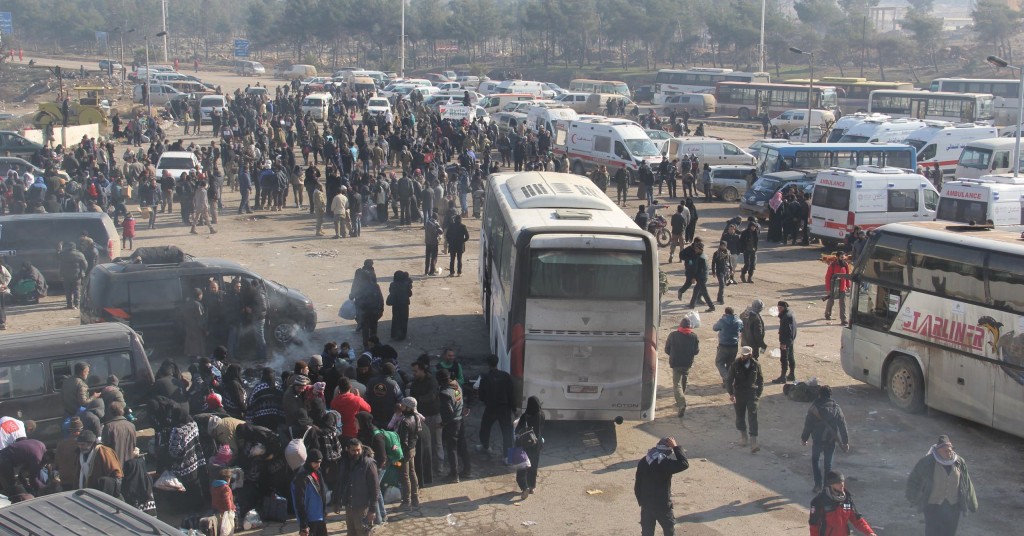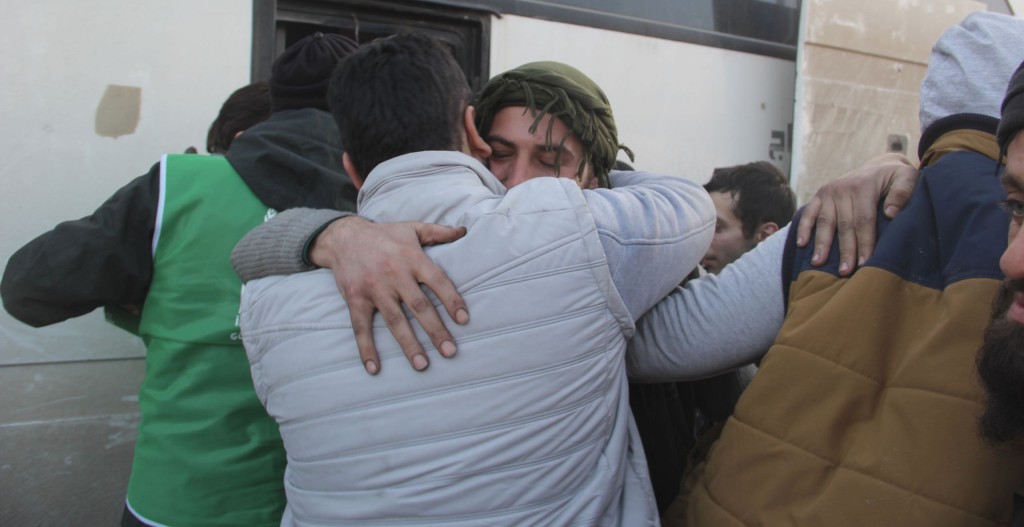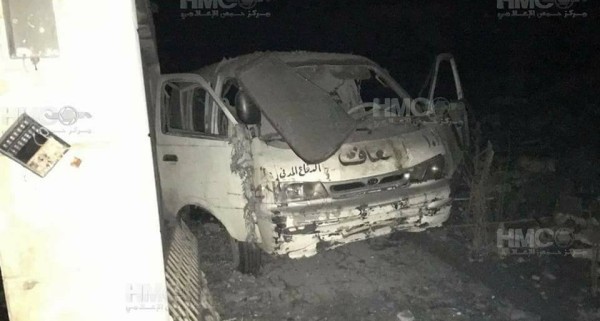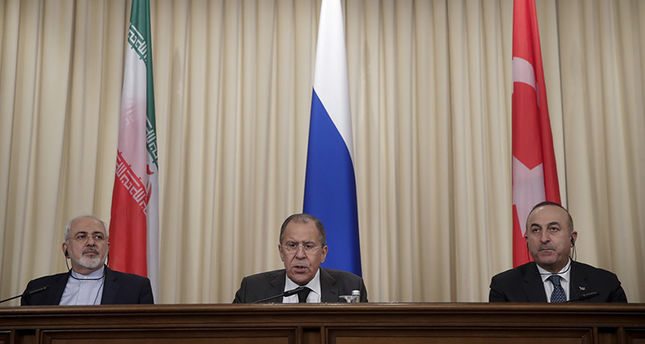PHOTO: Iranian Foreign Minister Mohammad Javad Zarif and Russian and Turkish counterparts Sergei Lavrov and Mevlut Cavusoglu
LATEST
TUESDAY FEATURE
Analysis: Why UN Peacekeepers Did Not Intervene in Aleppo
UPDATE 1800 GMT: The Russian-Turkish-Iranian talks have concluded with a press conference.
Few details were given, but the statements gave a show of unity. Russian Foreign Minister Sergei Lavrov said, “The ministers agree with the importance of widening the ceasefire, of free access for humanitarian aid, and movement of civilians on Syrian territory.”
Turkish Foreign Minister Mevlüt Çavuşoğlu noted that it is important to impose a country-wide ceasefire in Syria and said all three ministers pledged to “act as guarantors” and provide assistance to prepare an agreement between the Assad regime and the opposition.
UPDATE 1015 GMT: In a sign of possible division from Russia, a high-ranking Iranian official has condemned the UN Security Council resolution mandating international monitors in Aleppo city and other parts of Syria.
Ali Shamkhani, the secretary of Iran’s Supreme National Security Council (SNSC), said the resolution “prioritized the evacuation of militants in Aleppo over the safe exit of civilians”.
After vetoing six Security Council resolutions on Syria since 2011, Russia worked with France to craft a text acceptable to Moscow. The compromise draft was unanimously adopted on Monday.
Shamkhani said the resolution ignored the role of the Assad regime.
(Cross-posted from Iran Daily)
UPDATE 0910 GMT: Removals of thousands of people in eastern Aleppo city are continuing.
Still ongoing
The evacuation process from this morning 5 buses have arrived waiting from the rest from east #Aleppo who are being displaced— Zouhir_AlShimale (@ZouhirAlShimale) December 20, 2016
The convoys resumed on Sunday, after two previous agreements had been undermined by Iranian objections and attacks by Iran-led and pro-Assad militias, and were maintained despite an assault on buses moving people from two enclaves in Idlib Province.
See Syria Daily: Aleppo Removals Restarted, Despite More Violence
The Red Cross says 25,000 people have been moved from eastern Aleppo since Thursday, while 750 have been transported from the regime enclaves of al-Fu’ah and Kafraya.
Arrivals in western Aleppo Province:


ORIGINAL ENTRY: Foreign and defense ministers of Russia, Iran, and Turkey will confer on Tuesday over the future of Syria.
The talks, held in Moscow, spurred by the imminent occupation of all of Syria’s largest city Aleppo by foreign forces — including Iranian ground units and Iranian-led Iraqi and Afghan militia, supported by Russian airstrikes — alongside Assad regime units.
Russia and Iran have been essential backers of President Assad since the uprising began in March 2011, while Turkey has supported the Syrian opposition and rebels. Relations between Moscow and Ankara were at breaking point in November 2015, after Turkish jets shot down a Russian warplane near the Syrian-Turkish border.
However, since a reconciliation between Turkish President Recep Tayyip Erdoğan and Russia’s Vladimir Putin in the summer, the two sides appear to have co-operated over operations in and near Aleppo. Ankara has stood aside while pro-Assad forces besieged, bombed, and launched ground attacks, while Russia has accepted Turkey’s military intervention that has helped rebels take part of Aleppo Province from the Islamic State.
The Russian-Iranian-regime recapture of Aleppo city raises further issues. Iran undermined two agreements, brokered by Russia and Turkey, for removals from the last opposition districts in Aleppo before finally accepting terms last weekend.
Tehran may also back the Assad regime’s desire to reclaim remaining opposition areas, notably in Idlib Province in northwest Syria on the Turkish border. Russia may be more reluctant, preferring the possibility of a political resolution accepting an opposition presence while confirming Assad in power — and the Russian military in a long-term presence — across much of the country.
The meeting has also been overshadowed by Monday’s assassination of the Russian Ambassador to Turkey as he spoke at an art gallery in Ankara. Erdoğan and Putin quickly indicated that the killing would not disrupt their cooperation.
See Developing: Russian Ambassador to Turkey Assassinated in Ankara
An official from Turkey’s Foreign Minister was cautious about expectations in a Monday briefing of international media:
[The meeting] will be to understand the views of all three sides, laying out where we all stand and discuss where we go from here.
It is not a miracle meeting, but will give all sides a chance to listen to each other.
The Russian Foreign Ministry said the discussion would be over a resolution of the conflict and fulfillment of UN Security Council resolutions.
After casting six vetoes in the Council over proposals for ceasefires and international intervention, Russia finally agreed with other Council members on Sunday over a measure for foreign monitors to enter Aleppo city and other parts of Syria.
Foreign Minister Sergei Lavrov pointed to the exclusion of the US — which had tried to forge a political resolution through discussions with Moscow since September 2013 — as he told reporters yesterday:
We hope to speak in detail and concrete terms with those who can really bring about an improvement in the situation on the ground, while our Western partners are busier with rhetoric and propaganda and aren’t influencing those who listen to them.
Regime Bombing of Civil Defense Center in Homs
In their latest attack on civil defense, regime forces have bombed a center in the besieged al-Wa’er district of Homs city.
Activists said an ambulance was damaged and knocked of service.

Reports: Regime Cluster Bomb Attacks Near Damascus
The White Helmets civil defense organization and pro-opposition activists are reporting regime cluster bomb attacks near Damascus on Tuesday morning.
Airstrikes have targeted the areas of Madyara, Douma, Bait Sawa, Shaifouniya, and Hamouriya in the Eastern Ghouta area.
Multiple casualties are reported from three cluster bombs on a civilian site in Misraba.
Pro-Assad forces have taken much of East Ghouta this year and are trying to force the capitulation of the rest, including the key town of Douma, through sieges and regular bombardment and airstrikes.
"Aziz" of @SyriaCivilDef volunteers was injured after being targeted with double tap during a rescue operation in #Msraba-Rif Dimashq pic.twitter.com/xF3TwOIkit
— SCD RifDimashq (@SCDrifdimashq) December 20, 2016

